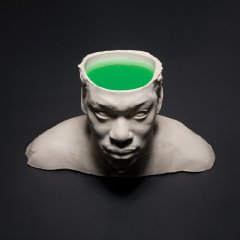2008 has proven to be, against the wildest of predictions, the year Black-British MC culture hit the mainstream. The estranged grime twosome Wiley and Dizzee Rascal achieved their highest chart positions to date with ironically (or perhaps inevitably) their most throwaway songs yet, ‘Wearing My Rolex’ and ‘Dance Wiv Me’, peaking at number two and one respectively. Grime, albeit a polished up, radio friendly version, has hit the (fragmented, 21st Century) big time.
Yet before Wiley, before Diz, there was Roots. During the 1990s Roots Manuva (aka Rodney Smith) graduated from the UK dancehall scene, gaining wider recognition with his Mobo award winning debut Brand New Second Hand. His second, Run Come Save Me, cemented his unique position in UK music. Before Roots, a black British MC wasn’t someone who could hold their own in pop; they were the voice on acid house and drum and bass records, not the main attraction. His Big Pop Moment was ‘Witness (1 Hope)’, voted the best British hip hop track in Hip Hop Connection magazine, setting the standard for a new type of MC.
On Slime & Reason he’s eager to remind us of this. "A lot of people don’t know about Smith", he begins opener ‘Again & Again’. "How I came to the scene and came to uplift". It’s a sunshine track, infused with the spirit of Studio One, but Smith is in no mood to relax. "I see the future where the culture looks corroded/ Do the chat mic but the dudes are just posers/They don’t know where the soul is, so I’m about to bring that back", he rhymes. It seems a direct swipe, at a general lyrical banality in a British MC culture increasingly focussed on beef and bling. Sure, Smith still has some bling – "nice trainers… nice suits/Expensive wristwatch, expensive boots", he raps on ‘2 Much 2 Soon’, but he’s a realist. "In the event that I don’t earn nothin’/I’m bound to sell all of these things/All my bling/Yes, and rightly so". This working class British make-do vibe distinguishes Smith from his more successful peers. But its also one that keeps him wallowing around with the rest of us, instead of shooting into the stratosphere. He’s the archetypal English nearly man; "Still independent/Nobody knows me/Still got my trophy/Underground mostly" he raps on ‘Well Alright’.
One highlight is ‘Let the Spirit’, produced by Metronomy. It’s equal parts uplifting and edgy, like Gospel if envisaged by Kraftwerk. (Am I the only one who is reminded of the wonkier synthy moments on GZA’s Liquid Swords, I’m thinking ‘Hell’s Wind Staff’/’Killah Hills 10304’). Like much of his oeuvre, it positions Smith as Rodney, the God-fearing son of a lay-deacon of a South London Pentecostal church, giving his definition of the Lord as ‘the strength that breaks the shackle and chain’. In a way, Smith is like the Anglo-Jamaican John Bunyan, constantly battling between his internalised Christian morals, and the natural human inclination to drink, smoke, and fuck. These days he’s got kids, and with that comes responsibility, and regret. "So what have I become/A long streak of piss/A drunkard bum", he reflects on slow, skronky soul track ‘The Show Must Go On’.
Smith grew up around the Jamaican sound systems around Brixton and Stockwell, and the culture oozes through him from his patois-inflected toasting, to his dub-style production. He is a 21st century Brit-reggae everyman, the connecting point between the sermonizing of roots musicians, the loopy stoner tangent following of dub mavericks like Lee Scratch Perry, and the frenetic braggadocio of ragga and dancehall. Here he’s raised the tempo by upping the influence of the latter by drafting in Sheffield’s hot young electro-dancehall DJ Toddla T, who turns Roots into a dance floor force again on the futuro-ragga tracks ‘Buff Nuff’, ‘Do Nah Bodda Mi’, and ‘I’m a New Man’.
One of the most intriguing lines on the album is found on "I’m a New Man. ‘Facts and fiction/Tricks and tricknology/It’s just too late for their half assed apology". Tricknology has been used to describe the deceitful tactic of the white man to keep the black race in their place, but it is also (perhaps more familiarly to Quietus readers) refers to the title of a piece on Tricky by Ian Penman that appeared in Wire Magazine in 1995. The piece, entitled (The Phantoms of) TRICKNOLOGY (Versus a Politics of Authenticity), proved to be one of the most influential pieces of journalism about reggae in recent times. Penman, spurred on by a distaste for the old fashioned polemic of roots reggae a la Bob Marley (who is referred to as ‘an olde-world flat-Earth icon’) and a love for the seemingly rootless, studio based dub, suggested that "tricknology is a form of magic which indeed make people disappear, leaving behind only their context, their (t)race, their outline".
Yet problems arise when one just disappears. A review by Louis Pattison on this site summed up the failure of Tricky’s Knowle West Boy; "You can shatter your history, escape your past, dig into your id and streak a path across the sky. But you can never go home again", it read. Unlike Tricky, Smith has never left the UK (he is called Roots for Chrissakes), but on Slime & Reason, which is his most consistently dazzling album yet, you feel he is using the familiarity to his advantage. I recently heard him described as British rap’s Tom Waits. At first I balked, but it’s beginning to make sense. Like Waits he has set up an arsenal of poetic iconography particular to him (God, the Devil, Babylon) that he can run with, reshaping them through the years. A scorched earth policy might get one farther more quickly in music, but when the dust settles you might have forgotten what the point was in the first place.


